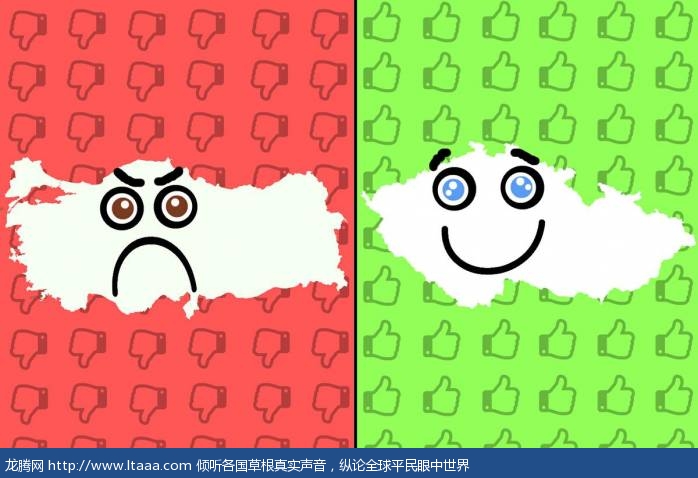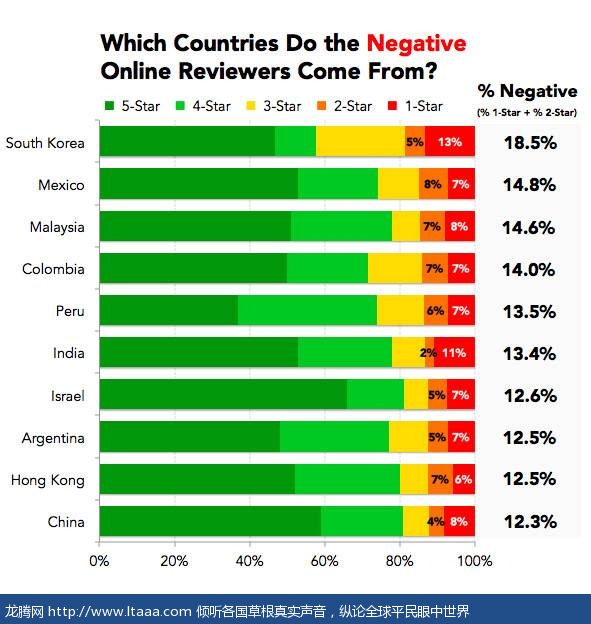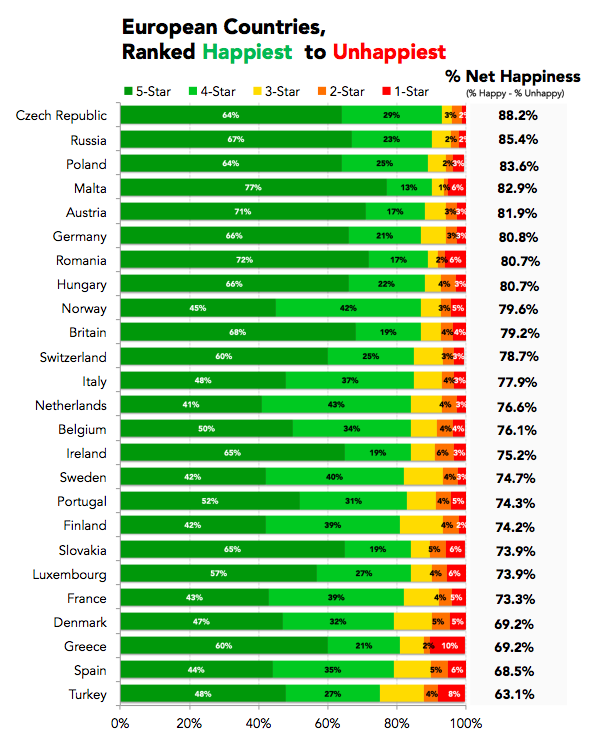哪国有最刻薄的游客? [美国媒体]
本邮报改编于GetYourGuide——一家Priceonomics 消费者数据工作室。你所在的公司有有趣的数据吗?加入Priceonomics消费者吧。某些国家有比其他国家更刻薄,更粗俗,更消极的游客吗?然而,尽管绝大多数游客给出好评,但与其他国家的相比,有些国家的游客表现得确实更挑剔。
Which Country Has the Meanest Tourists?
哪国有最刻薄的游客?
This post is adapted from GetYourGuide,a Priceonomics Data Studio customer. Does your company have interesting data?Become a Priceonomics customer.
本邮报改编于GetYourGuide——一家Priceonomics 消费者数据工作室。你所在的公司有有趣的数据吗?加入Priceonomics消费者吧。
Are tourists from some countries meaner,ruder, and more negative than others?
某些国家有比其他国家更刻薄,更粗俗,更消极的游客吗?
It's a difficult question to answer, but wedecided to use online data to try to figure out the answer. We analyzed datafrom GetYourGuide, a Priceonomics customer that offers 26,000 internationalactivities and tours that receive reviews from people all over the world.
这个问题很难回答,但我们试图通过网上数据找出答案。我们分析了由GetYourGuide, Priceonomics消费者数据工作室提供的26,000项关于国际活动和旅游的数据,以便回顾世界各地游客的评价。
Do travelers from certain countries tend toleave more scathing reviews? Are residents of certain parts of the world moregenerous with their 4 or 5-star ratings? Who are the most and least happiesttravelers?
倾向于给差评的游客主要来自于几个特定的国家吗?世界的某些地方,有居民在星级评定中会更慷慨地给出四星或五星吗?在旅游中,哪些国家的人最幸福,哪些最不幸福呢?
Analyzing data from the top 50 countries interms of the available data, we found that South Koreans left the most criticaland scathing reviews. The happiest and most generous reviews came from the Czech Republic.
通过对可获得的,关于世界前50强国家旅游数据的分析,我们发现韩国旅客留下的评论最尖酸刻薄。杰克共和国留下的评论表现得最幸福,也最慷慨。
All of the reviews we compiled werebased on a 1 to 5-star scale (1-star = terrible; 5 = excellent). For ouranalysis, we defined “happy” as those who left the highest percentage of 4 and5-star reviews, and we defined “unhappy” as those more critical reviewers wholeft the highest percentage of 1 and 2-star reviews.
我们编辑的所有的评论都在一到五星之间(一星=糟糕;五星=优秀)。为了便于分析,我们将“幸福”群体定义为,在评论中留下四星和五星百分比最多高的游客,将“不幸福”群体定义为在评论中,留下一星和两星,也就是更偏向于给出尖刻评,且其百分比最高的游客。
Here’s how travelers from the United States measured up:
以下是对美国籍游客的测量:
Just 11% of Americans gave negative (1 and 2-star) reviews.So how does that stack up against countries that give the worst reviews? Andwhich countries are home to the unhappiest, most critical customers?
只有百分之十一的美国人给了消极评价(一颗星和两颗星)。那么,凭这些积累的数据,怎么才能找出是哪些国家的游客给出的评价最差呢?哪些国家的游客最不幸福,最爱批评呢?
Surprisingly, 18.5% of all reviews left by South Koreans areeither 1-star or 2-star ratings. The country also maintains the highestpercentage of 3-star reviews, at 27%. Asian countries make a formidable showingon this disapproving list: people from Malaysia,Hong Kong and Chinaare critical of their experiences too.
出乎意料的是,韩国人留下的评论中有18.5%要么是一星,要么就是两星。而且,该国给出三星的评价比例达27%,一直属于最高。大量亚洲国家的游客更偏向于给差评:马来西亚、香港和中国大陆的游客对自己的旅游经历也表示不满。
Spanish-speaking countries also give lots of lowratings: Mexicans, Colombians, Peruvians and Argentinians all leave relativelyhigh percentages of poor reviews.
西班牙语国家给出等级低的评价:所有来自于墨西哥,哥伦比亚,秘鲁以及阿根廷的游客,给出的差评百分比相对要高些。
The good news? If you look at the breakdown ofthe reviews, you’ll notice that the overwhelming majority are still positive —and remember, these are the unhappy, more critical countries.
好消息呢?如果你仔细看看这些数据分析,你会发现绝大多数人还是积极的——记住,这些人来自于那些不幸福,更爱批评的国家。
So, where do the happiest travelers come from?
那么,最幸福的游客来自于哪里?
Czech travelers are particularly happy: 92.3% of all reviewswere a 4 or 5-star review. People from Russiaand Polandtrail closely behind — though the distribution of 4 and 5-star reviews varies.
捷克的游客格外幸福:有92.3%的评论是四星或者五星。俄国和波兰的游客紧随其后——尽管四星和五星的评价分布情况变动很大。
An astonishing 71% of Austrians leave 5-starreviews, compared with Norway’s45%. But a much higher percentage of Norwegians leave 4-star reviews thanAustrians do.
与挪威人45%的五星评论相比,奥地利人占75%,真令人惊讶。但挪威人的四星评论百分比要比奥地利人的高很多。
Notably, all ten of the nicest countries are in Europe.
显然,最令人愉快的前十国分布在欧洲。
Are all European tourists so agreeable? Wepulled out our data for 25 European countries and ranked them by the differencebetween happy and unhappy review rates, which we call “net happiness.”
所有的欧洲游客都这样随和吗?调出我们收集的关于欧洲二十五个国家的游客数据,并根据评论表现出的幸福与否的比例来给它们排序,我们把这称为“幸福净值”。
Here we see that not all Europeans are so positive. AmongEuropeans, Turkish people leave the highest percentage of negative reviews andhave the lowest percentage of positive reviews — for a net happiness of 63.1%.And their neighbors, Greece,are similarly low at 69.2%.
我们发现,并不是所有的欧洲人都很乐观。在他们中,土耳其人留下的差评百分比最高,好评百分比最低——幸福净值为63.1%。土耳其邻国,希腊的幸福净值也差不多一样低,只有69.2%。
The top countries in Europe by net happiness aresimilar to the overall happiness ranking, with the CzechRepublic, Russia,and Polandtaking the top three spots. With only a 4.6% negative review rate, Russians arethe least critical country. Travelers in the Scandinavian countries of Norway, Sweden,and Finland tend to givefewer 5-star ratings and more 4-star ratings, as do people from the Netherlands.
幸福净值较高的欧洲国家排名与所有幸福排名的数据显示相似。捷克共和国,俄国和波兰属于幸福国家前三甲。来自俄国的差评最少,只有4.6%。来自挪威斯堪的纳维亚地区,瑞典及芬兰的游客很少给五星评价,而更偏向于给四星评价,荷兰人也这样。
Of course this data only represents reviews fromGetYourGuide — and this is only a portion of all online reviews. Highlycritical reviewers are not exclusive to any single region.
当然,以上数据仅反应GetYourGuide上的评价----只是网上评价的一部分。给出十分尖刻评论的游客并不是仅仅来自于世界某一个地区。
Still, while the overwhelming majority ofcustomers leave positive reviews, some countries do tend to be more criticalthan others.
然而,尽管绝大多数游客给出好评,但与其他国家的相比,有些国家的游客表现得确实更挑剔。
Daniel • 11 days ago
The conclusion does not follow from the data. South Koreans could actually be the "nicest" tourists, and merely going more frequently to lower rated places. Also, since when does bad reviews = mean?See: https://en.wikipedia.org/wiki/...3
该推论不符合数据显示。事实上,韩国人应该是最随和的游客,只是更经常地去些评价等级低的地方罢了。还有,要弄清什么时候属于差评?请看: https://en.wikipedia.org/wiki/...3
lump1 Daniel • 8 days ago
I guess South Korean tourists must then take their holidays in some pretty awful places. I wonder: Where do they go? North Korea? Holiday in Cambodia? (Like the Dead Kennedys song...)
那么,我猜韩国游客一定是在一些很糟糕的地方度假的。我想知道,他们究竟去了哪里?朝鲜吗?还是柬埔寨?(就像The Dead Kennedys这首歌……)
Gail8574 lump1 • 4 days ago
I basically profit approximately six to eight thousand dollars /every month with my online job. Everyone prepared to do easy computer-based work for several h /day from your living room and get decent payment in the same time... This is a job for you... http://ur1.ca/p7vw7szedfr5fgrdg5f
每个月,我通过网上工作基本可以挣到大约六到八千美元。每个人都希望每天花几个小时,通过电脑做些容易的工作,同时也能拿到体面地薪水……。这里有你想要的工作...... http://ur1.ca/p7vw7szedfr5fgrdg5f
Bedoin • 11 days ago
Whoa! These people aren't all reviewing the same attractions/experiences so we really can't be sure who are the "meanest" versus "happiest" tourists.3
哇!不是所有的游客都对相同的风景区,或者相同的经历作出评价,所以我们真的找不出谁是最“刻薄”,谁是最“幸福”的游客。
Sunwooz • 11 days ago
Wait... You're using negative reviews as a way to measure how rude/mean tourists are?3
等等……。用粗俗、刻薄这样的词评价游客,你自己不是在给差评吗?。
rgmz • 10 days ago
From the title I would have expected how tourists are viewed in the countries they go to and not how tourists rate their holiday destinations. Apart, from the clickbaity title, can you share how many reviews in total and per country actually went into this analysis? I find data analysis without saying anything about the sampling process has no real value.2
看到标题时,我认为写的是旅游国对游客的看法,而不是游客对他们度假的旅游国的评价。除了给出这个有诱惑力的标题外,你能分享出总共有多少评论,以及参与分析的每一个国家又有多少评论吗?我发现,没有提及到抽样过程的数据分析,没有真正的价值。
John Smith • 8 days ago
Pretty sure Americans remain the most obnoxious tourists worldwide. Everything in America is bigger, better and cheaper, and they don't mind letting the rest of you third world nations know about it. Within America, New Yorkers are the biggest jerks.
很确定,来自于美国的游客是全世界最讨厌的。美国所有的东西都要大些,好些,便宜些,他们也不介意让你们这些第三世界的国家的人知道。在美国,最混蛋的又要数纽约人了。
版权声明
我们致力于传递世界各地老百姓最真实、最直接、最详尽的对中国的看法
【版权与免责声明】如发现内容存在版权问题,烦请提供相关信息发邮件,
我们将及时沟通与处理。本站内容除非来源注明五毛网,否则均为网友转载,涉及言论、版权与本站无关。
本文仅代表作者观点,不代表本站立场。
本文来自网络,如有侵权及时联系本网站。
图文文章RECOMMEND
热门文章HOT NEWS
-
1
Why do most people who have a positive view of China have been to ...
- 2
- 3
- 4
- 5
- 6
- 7
- 8
- 9
- 10
推荐文章HOT NEWS
-
1
Why do most people who have a positive view of China have been to ...
- 2
- 3
- 4
- 5
- 6
- 7
- 8
- 9
- 10















